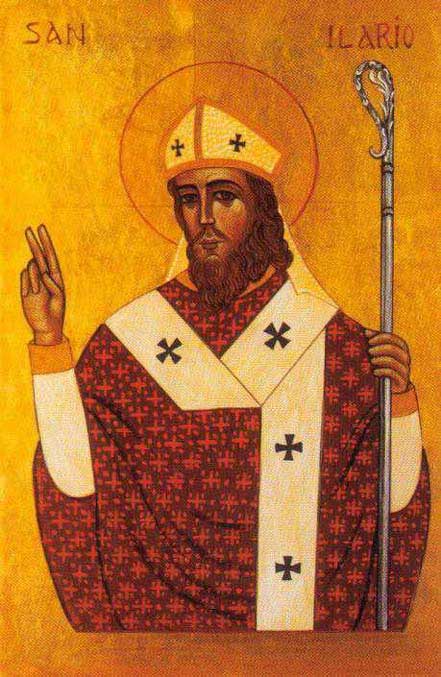Podcast: Play in new window | Download (Duration: 31:30 — 21.7MB) | Embed
Subscribe: Apple Podcasts | Spotify | Amazon Music | Android | Pandora | iHeartRadio | JioSaavn | Podchaser | Gaana | Podcast Index | Email | TuneIn | Deezer | Anghami | RSS | More
St. Hilary of Poitiers – The Doctors of the Church: The Charism of Wisdom with Dr. Matthew Bunson
- Born: 310 AD,
- Died: May 2, 367 AD
Dr. Matthew Bunson and Kris McGregor discuss St. Hillary of Poitier’s life, conversion, and role in combating Arianism. Despite being the “Hammer of the Aryans,” his gentleness and charity emphasized Christ-like love in defending the faith.
“To sum up the essentials of his doctrine, I would like to say that Hilary found the starting point for his theological reflection in baptismal faith. In De Trinitate, Hilary writes: Jesus
“has commanded us to baptize in the name of the Father and of the Son and of the Holy Spirit (cf. Mt 28: 19), that is, in the confession of the Author, of the Only-Begotten One and of the Gift. The Author of all things is one alone, for one alone is God the Father, from whom all things proceed. And one alone is Our Lord Jesus Christ, through whom all things exist (cf. I Cor 8: 6), and one alone is the Spirit (cf. Eph 4: 4), a gift in all…. In nothing can be found to be lacking so great a fullness, in which the immensity in the Eternal One, the revelation in the Image, joy in the Gift, converge in the Father, in the Son and in the Holy Spirit” (De Trinitate 2, 1). God the Father, being wholly love, is able to communicate his divinity to his Son in its fullness. I find particularly beautiful the following formula of St Hilary: “God knows not how to be anything other than love, he knows not how to be anyone other than the Father. Those who love are not envious and the one who is the Father is so in his totality. This name admits no compromise, as if God were father in some aspects and not in others” (ibid., 9, 61).
For this reason the Son is fully God without any gaps or diminishment. “The One who comes from the perfect is perfect because he has all, he has given all” (ibid., 2, 8). Humanity finds salvation in Christ alone, Son of God and Son of man. In assuming our human nature, he has united himself with every man, “he has become the flesh of us all” (Tractatus super Psalmos 54, 9); “he took on himself the nature of all flesh and through it became true life, he has in himself the root of every vine shoot” (ibid., 51, 16). For this very reason the way to Christ is open to all – because he has drawn all into his being as a man -, even if personal conversion is always required: “Through the relationship with his flesh, access to Christ is open to all, on condition that they divest themselves of their former self (cf. Eph 4: 22), nailing it to the Cross (cf. Col 2: 14); provided we give up our former way of life and convert in order to be buried with him in his baptism, in view of life (cf. Col1: 12; Rom 6: 4)” (ibid., 91, 9).
Fidelity to God is a gift of his grace. Therefore, St Hilary asks, at the end of his Treatise on the Trinity, to be able to remain ever faithful to the baptismal faith. It is a feature of this book: reflection is transformed into prayer and prayer returns to reflection. The whole book is a dialogue with God.
I would like to end today’s Catechesis with one of these prayers, which thus becomes our prayer:
“Obtain, O Lord”, St Hilary recites with inspiration, “that I may keep ever faithful to what I have professed in the symbol of my regeneration, when I was baptized in the Father, in the Son and in the Holy Spirit. That I may worship you, our Father, and with you, your Son; that I may deserve your Holy Spirit, who proceeds from you through your Only Begotten Son… Amen” (De Trinitate 12, 57).”
For more visit Vatican.va
Discerning Hearts Reflection Questions:
- How can I deepen my personal relationship with God through prayer and scripture study?
- In what ways do I demonstrate charity and Christ-like love in my interactions with others?
- Reflect on a challenging situation and consider how St. Hillary’s approach of gentleness and diplomacy could be applied.
- How can I contribute to promoting unity within the Church and combatting contemporary heresies or misconceptions?
- In my faith journey, am I open to the transformative power of scripture, as St. Hillary was in his commentary on the Gospel of Matthew?
- How can I balance being a fierce defender of the faith with embodying the virtues of gentleness and charity, following St. Hillary’s example?
For more on St. Hilary of Poitiers and his teachings:
Hilary of Poitiers
– On the Councils, or the Faith of the Easterns
– On the Trinity
– Homilies on the Psalms
For more from Dr. Matthew Bunson check out his Discerning Hearts page
Dr. Matthew E. Bunson is a Register senior editor and senior contributor to EWTN News. For the past 20 years, he has been active in the area of Catholic social communications and education, including writing, editing, and teaching on a variety of topics related to Church history, the papacy, the saints, and Catholic culture. He is faculty chair at Catholic Distance University, a senior fellow of the St. Paul Center for Biblical Theology, and the author or co-author of over 50 books including The Encyclopedia of Catholic History, The Pope Encyclopedia, We Have a Pope! Benedict XVI, The Saints Encyclopedia and best-selling biographies of St. Damien of Molokai and St. Kateri Tekakwitha.



